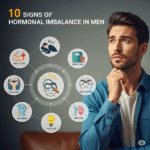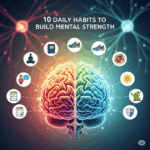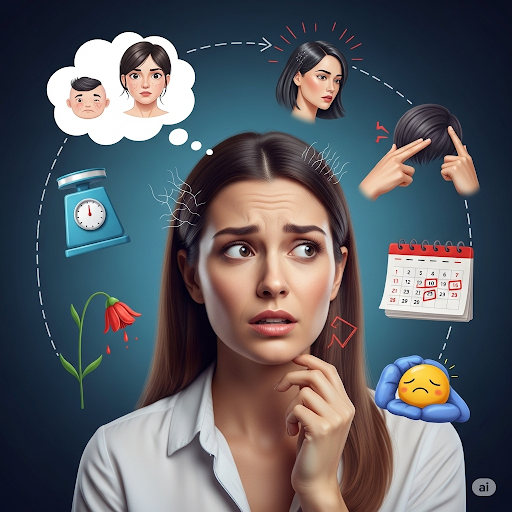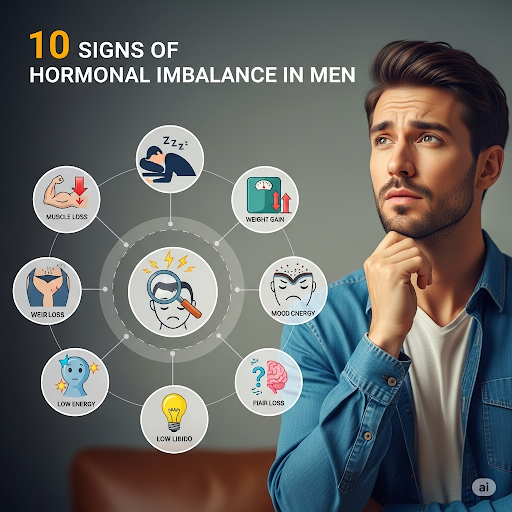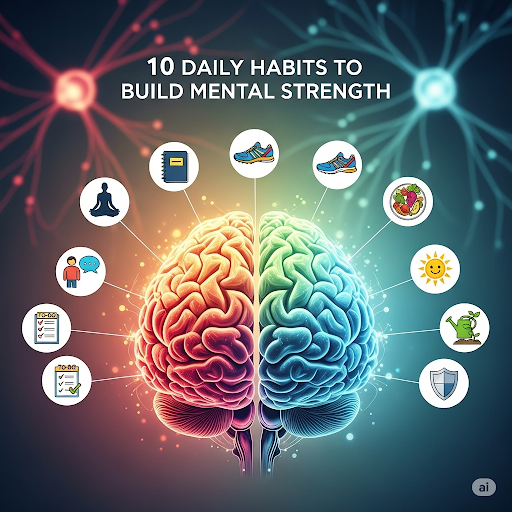Introduction: When Hormones Whisper, Then Scream
Hormones might be tiny messengers inside your body, but when they’re out of sync, they can throw your whole world off balance. And for women, the signs can often feel confusing one day you’re exhausted, the next you’re anxious for no reason, then suddenly your skin breaks out like you’re a teenager again. Sound familiar?
Hormones regulate almost everything: your mood, sleep, weight, skin, energy, libido, and even your digestion. When they work in harmony, you feel like your best self clear-headed, confident, strong. But when even one hormone goes rogue, things can start to feel off in ways that are hard to describe, let alone explain to others.
And here’s the tricky part: many women live with hormonal imbalance for years without realizing it. They brush it off as stress, aging, or just being “busy.” But your body is always speaking to you it starts with whispers, and if you ignore them, those whispers turn into symptoms that are impossible to ignore.
Let’s walk through the most common signs your body might be dealing with a hormonal imbalance. Each one is a signal a gentle nudge from your inner system asking for attention, care, and maybe a few changes to bring you back to balance.
Fatigue That No Amount of Sleep Can Fix
If you’re getting a full night’s sleep but still wake up feeling like you’ve been hit by a truck, your hormones may be to blame. Cortisol, the hormone that regulates your energy and stress response, can become dysregulated due to chronic stress or adrenal fatigue. When cortisol is too low in the morning or too high at night, you feel exhausted all day and wired when it’s time to sleep. Thyroid hormones can also play a major role low thyroid function (hypothyroidism) often causes deep, unrelenting tiredness that doesn’t go away with rest.
Irregular or Missing Periods
Your menstrual cycle is like a monthly report card from your hormones. When your periods become irregular, unusually heavy, or disappear altogether, it’s a clear sign something’s off internally. Estrogen, progesterone, FSH, and LH need to be in a delicate dance each month. If one of them goes missing or over-performs, your cycle suffers. This can happen due to PCOS, perimenopause, extreme stress, or even excessive exercise. A missed period isn’t always pregnancy it could be your hormones waving a red flag.
Persistent Weight Gain or Sudden Weight Loss
When your hormones are balanced, your metabolism tends to function smoothly. But if you’re gaining weight despite eating well and exercising or losing weight uncontrollably without trying it could be a sign of an underlying issue. Insulin resistance (common in PCOS), low thyroid function, high cortisol, or estrogen dominance can all disrupt your body’s ability to regulate fat. In some cases, muscle mass decreases and fat accumulates, especially around the belly or hips. And it’s not just about appearance your body is holding on to fat because it’s trying to protect itself from perceived chaos.
Mood Swings, Anxiety, or Depression
Have you ever felt completely fine one moment, then irrationally weepy or irritable the next? That’s often your hormones at work. Estrogen and progesterone influence neurotransmitters like serotonin and dopamine when they shift, so does your mood. Women with imbalanced progesterone often report anxiety, panic attacks, or emotional overwhelm. Estrogen dominance can make you feel edgy, angry, or wired. And when these moods become chronic, they’re often misdiagnosed as depression without investigating the root hormonal causes. Emotional instability doesn’t mean you’re unstable it means your body is out of rhythm.
Acne That Just Won’t Quit
If you thought acne was something you left behind in high school, think again. Hormonal acne, especially around the chin, jawline, or cheeks, is a common sign of imbalance in adult women. Elevated androgens (like testosterone) can cause oil glands to go into overdrive, leading to clogged pores and deep, cystic breakouts. PCOS is a major culprit, but even minor hormonal shifts during your cycle can cause flare-ups. If your skin seems to follow a monthly pattern or resists all skincare efforts, it’s time to look at your hormones.
Low Libido and Vaginal Dryness
Sexual desire is deeply tied to your hormonal health. When estrogen, testosterone, and DHEA are in balance, your libido is strong, and intimacy feels natural. But if any of these hormones drop especially around perimenopause or postpartum you might find yourself uninterested, disconnected, or even uncomfortable during sex. Vaginal dryness is another common issue, especially with falling estrogen, making intimacy painful or awkward. This isn’t just about physical attraction it’s about how your body is responding hormonally, and that deserves attention and compassion.
Brain Fog and Memory Lapses
Forgetting where you left your keys is one thing. But when brain fog becomes a daily guest affecting your focus, clarity, or even your ability to speak clearly it can be terrifying. Estrogen plays a critical role in brain function, and when it declines, so does cognitive sharpness. Thyroid imbalance also slows down mental processes, making you feel like you’re wading through mud. If your mind feels hazy, slow, or confused even on a good day your hormones could be clouding your mental skies.
Sleep Troubles That Keep You Up All Night
Hormonal imbalance can turn your sleep schedule upside down. You might feel exhausted all day but suddenly alert at 2 a.m., staring at the ceiling. That’s often due to high nighttime cortisol, low melatonin, or fluctuating progesterone. Progesterone is a natural calming hormone, and when it drops, sleep can become fragmented or shallow. Estrogen also influences your body temperature and REM cycles, so any drop or spike can leave you tossing and turning. Poor sleep then worsens hormonal imbalance, creating a vicious cycle. If you dread bedtime, your hormones could be the reason.
Hair Loss or Thinning Hair
Our hair is like a reflection of our inner health, and when it starts to thin, fall out in clumps, or lose its luster, hormones are usually at play. Thyroid disorders, especially hypothyroidism, are well-known causes of hair thinning. Elevated androgens can cause a male-pattern baldness effect in women, particularly around the crown or hairline. Estrogen helps keep hair in the growth phase so when it drops, shedding begins. If you notice more hair in your brush, clogged drains, or a widening part, don’t just blame genetics check your hormone levels too.
Cravings and Blood Sugar Swings
If you’re constantly craving sugar, carbs, or salty snacks and feel shaky or irritable if you don’t eat right away it’s a classic sign of hormonal imbalance. Insulin resistance makes your cells less responsive to insulin, meaning your body has trouble processing glucose. This leads to intense hunger, energy crashes, and even night-time eating. Cortisol, the stress hormone, can also drive sugar cravings and increase belly fat storage. If your cravings feel like they’re controlling you, your body is trying to rebalance its internal chemistry.
PMS That Feels Like a Monster
Mild premenstrual symptoms are common but if your PMS turns you into a completely different person every month, it’s time to listen closer. Severe cramps, emotional meltdowns, irritability, breast tenderness, migraines, or bloating aren’t just “normal parts of being a woman.” These can be symptoms of estrogen dominance, low progesterone, or even inflammation. PMS that disrupts your life isn’t just annoying it’s a sign that your hormonal cycle is off-track. And it’s a cycle that can be healed, not just endured.
Digestive Issues That Fluctuate With Your Cycle
Believe it or not, hormones also affect your gut. Many women notice that they’re more constipated before their period, more bloated after ovulation, or more sensitive to certain foods during certain times of the month. Estrogen and progesterone both influence gut motility, stomach acid production, and even microbiome balance. If your digestion feels unpredictable or tied to your cycle, your hormones might be influencing more than just your mood they’re affecting your digestion too.
Feeling “Not Like Yourself”
Sometimes, hormonal imbalance doesn’t show up as one specific symptom it shows up as a quiet, nagging feeling that something is just… off. You may feel disconnected from yourself, emotionally flat, overly sensitive, or not in control of your body the way you used to be. This vague sense of unease is often one of the earliest signs of imbalance, especially during transitional phases like puberty, postpartum, or perimenopause. It’s your intuition whispering, “Hey, something’s changing. Pay attention.”
Final Thoughts: Your Body Isn’t Broken It’s Talking to You
Hormonal imbalance is not a flaw in your system it’s a signal. It’s your body’s way of asking for alignment, nourishment, rest, or change. The key is to listen.
You don’t have to live with chronic fatigue, skin issues, mood swings, or irregular cycles. These aren’t random they’re rooted in biology. With the right care, testing, nutrition, and sometimes medical guidance, balance can be restored.
You deserve to feel whole again. You deserve clarity, comfort, and the confidence that comes from being in sync with your own body. So if even one of these signs felt familiar, take it seriously and take it as the first step toward healing.
Would you like a follow-up article on natural ways to restore hormonal balance? I’d be happy to write that next.
